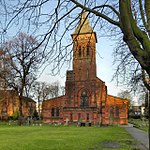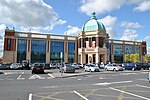Hale railway station
 Hale railway station in 2010 | |
| Location | Hale, Trafford England |
| Grid reference | SJ769869 |
| Managed by | Northern Trains |
| Transit authority | Greater Manchester |
| Platforms | 2 |
| Other information | |
| Station code | HAL |
| Classification | DfT category E |
| History | |
| Opened | 1862 |
| Passengers | |
| 2016/17 | |
| 2017/18 | |
| 2018/19 | |
| 2019/20 | |
| 2020/21 | |
| Notes | |
Passenger statistics from the Office of Rail and Road | |
Hale railway station serves the area of Hale in the south of Altrincham, Greater Manchester, England. It is also used by people living in the surrounding areas of Bowdon and Hale Barns. The station is located on Ashley Road. It is on the Mid-Cheshire Line, from Chester to Manchester Piccadilly, 8 miles south west of Manchester Piccadilly.
History[]

The station was opened as Peel Causeway by the Cheshire Midland Railway (CMR) on 12 May 1862 when the railway opened from Altrincham to Knutsford. The CMR was amalgamated into the Cheshire Lines Committee (CLC) on 15 August 1867. The station became Peel Causeway for Hale on 1 January 1899, and on 1 January 1902 it was renamed Hale. The station was served by passenger trains from Manchester Central to Northwich and Chester Northgate. The CLC remained an independent entity, as a joint London, Midland and Scottish Railway and London and North Eastern Railway operation after the Grouping of 1923, until the creation of British Railways (BR). The station then passed on to the London Midland Region of British Railways on nationalisation on 1 January 1948. When Sectorisation was introduced in the 1980s, the station was served by Regional Railways under arrangement with the Greater Manchester PTE (Now Transport for Greater Manchester) until the Privatisation of British Railways.
Facilities[]
The current station has a ticket office at Platform 1, which is open on weekday mornings. A ticket vending machine is in place for purchase of tickets outside of these hours and for the collection of pre-paid tickets. Digital station information boards are in operation on both platforms along public announcements. Car parking is available either side of the level crossing. A veterinarian surgery now occupies most of the station building on Platform 1 while there is a health clinic on Platform 2. The signal box is not in use any more.
Services[]
There is a basic hourly service in each direction on the Mid-Cheshire line on Mondays to Saturdays with two peak extras to/from Stockport. The through service to Blackpool North ceased to run from 15 December 2008.
On Sundays there were five trains to and from Chester but these all terminated at Altrincham prior to the timetable change, there being no service onwards to Stockport and Manchester Piccadilly. Through passengers had to use the Metrolink service to continue their journey (connections were advertised in the 2007-8 timetable and National Rail tickets were valid for through trips). From December 2008 however, the service frequency has been improved (to two-hourly each way) and through running to Stockport & Manchester Piccadilly reinstated for the first time since the early nineties. These services continued to Wigan Wallgate and Southport until May 2018; they now all terminate at Manchester Piccadilly.[1]
See also[]
References[]
- ^ GB National Rail Timetable 2013–14, Table 88
Griffiths, R.Prys (1978). The Cheshire Lines Railway. The Oakwood Press.
Further reading[]
- Mitchell, Vic; Smith, Keith (2013). Chester Northgate to Manchester. Middleton Press. figs. 69–73. ISBN 9781908174512. OCLC 892704846.
External links[]
| Wikimedia Commons has media related to Hale railway station. |
- Train times and station information for Hale railway station from National Rail
- Mid-Cheshire Community Rail Partnership
| Preceding station | Following station | |||
|---|---|---|---|---|
| Ashley | Northern Trains (Mid-Cheshire Line) |
Altrincham | ||
- Railway stations in Trafford
- Former Cheshire Lines Committee stations
- Northern franchise railway stations
- Railway stations in Great Britain opened in 1862




